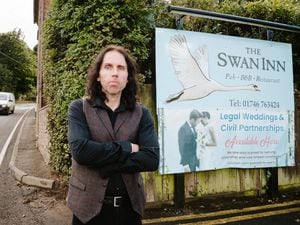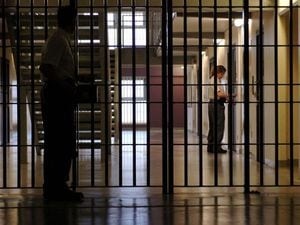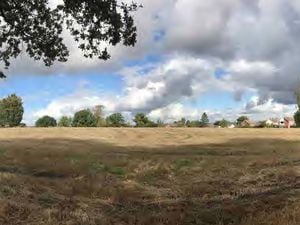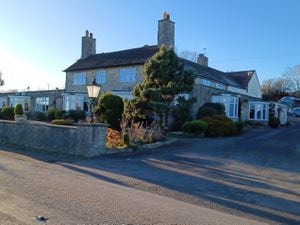Welcome to the Jungle - WATCH EXCLUSIVE report on Calais migrant crisis
Desperate asylum seekers, flimsy fences and French police that apparently couldn't care less – welcome to the Jungle in Calais.
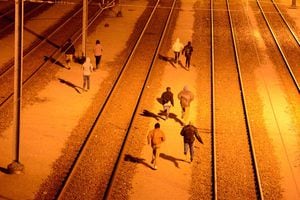
Over a chaotic 48 hours, the Express & Star witnessed migrants:
Crawling under fences with ease
Strolling down railway lines undetected by police
Living unsupervised in a huge refugee camp with no police or immigration officials present
And Police Nationale officers asleep on the job
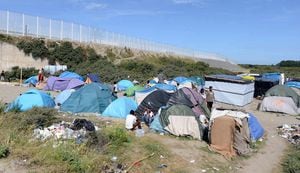
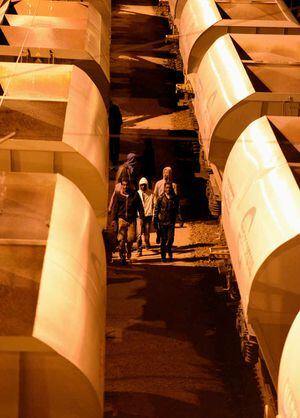
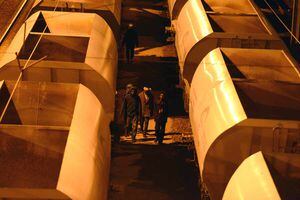
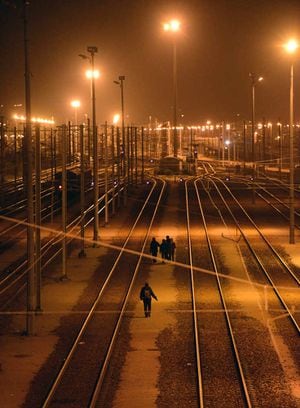
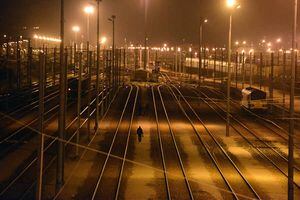
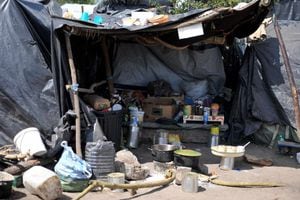
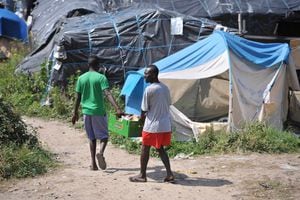
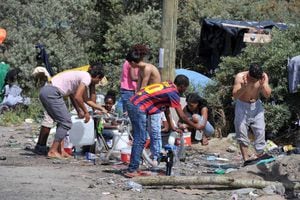
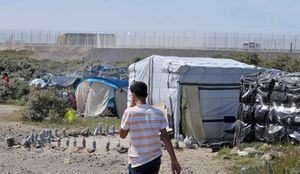
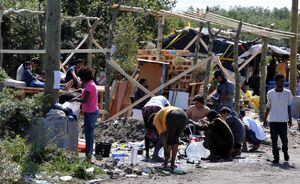
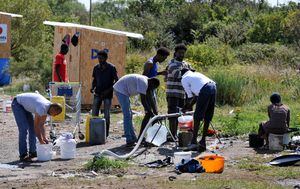
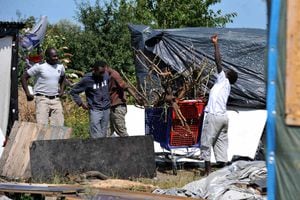
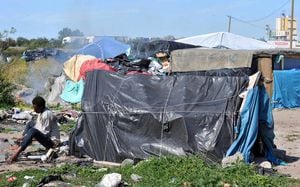
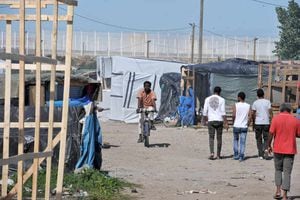
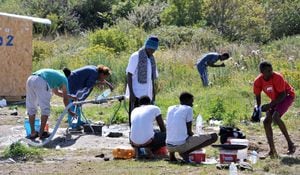
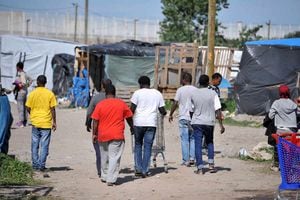
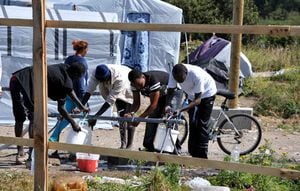
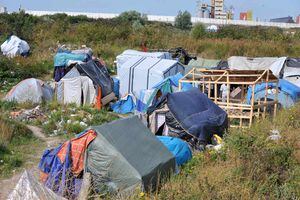
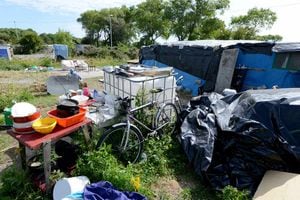
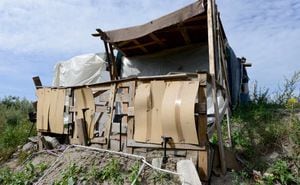
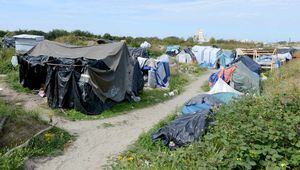
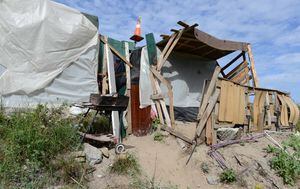
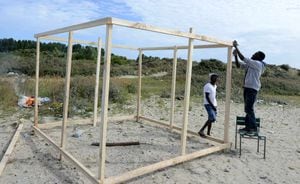
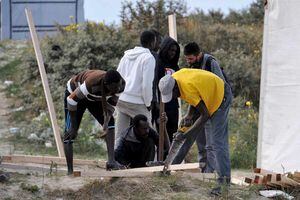
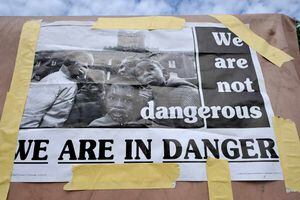
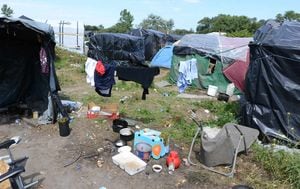
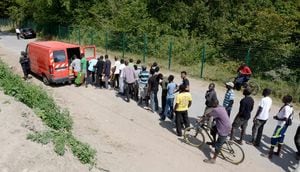
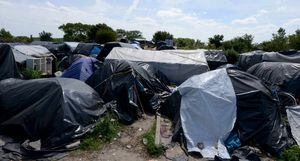

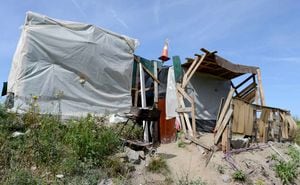
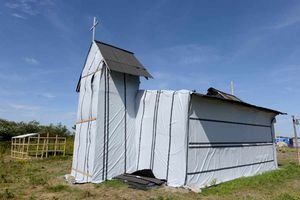
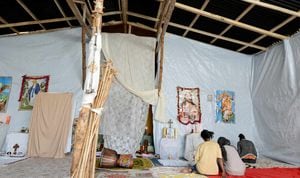
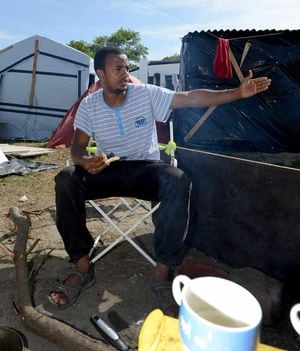
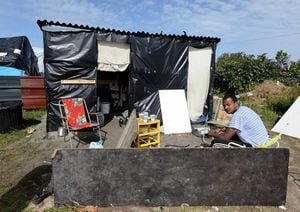
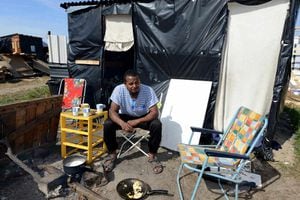
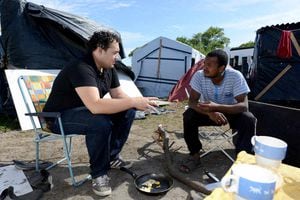

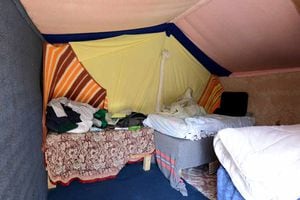
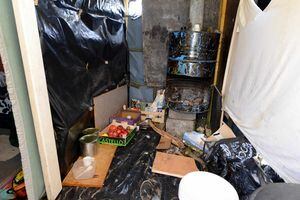


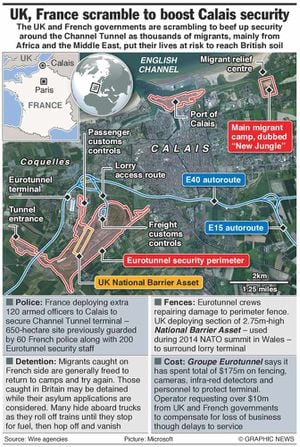
It is a shocking tale of lax security and control that will alarm readers and the authorities alike. The farce from the French authorities comes as they demand Britain pays millions towards the on-going crisis in Calais. Come dusk, hundreds of migrants descend on boggy marshland surrounding the Channel Tunnel terminal as they attempt to storm the perimeter fence and get into Britain.
While extra defences have been put in place around the lorry entrance, a huge freight compound is only protected by a single flimsy fence two miles from the tunnel entrance.
Migrants are able to simply lift up the bottom of the mesh and crawl under.
They then hide between stationary cargo carriages before making a mad dash for freedom towards the tunnel entrance in Coquelles.

And when caught by machine-gun wielding Gendarmerie, rather than be detained, the migrants are simply left by the side of the road to try again the next day. Hundreds of breaches of the Tunnel are still occurring each night despite claims by Foreign Secretary Philip Hammond that he had 'got a grip' on the crisis.
Four miles away a sprawling camp named the Jungle houses 5,000 migrants and grows by the day.
Amazingly, the 40-acre site is not overseen by military, police, or immigration officials. The migrants, mostly from Sudan, Afghanistan and Eritrea, have set up makeshift tents made of discarded wood and plastic sheets. One migrant, Ali, from South Sudan tells me: "Every day it is jungle, train, jungle, train, jungle, train. We get caught, get released, try again. What else can we do?"
England is our heaven

Every day migrants risk their lives to get into Europe, many with Britain in their sight.
During the Express & Star's visit we spoke to more than a dozen migrants who welcomed us into their makeshift homes to tell us why they were in Calais and how they had got there.
Many have fled war-torn countries in Africa where friends and family members have been killed. Others are trying to escape humanitarian disaster zones or brutal regimes.
Ali, Zezil, and Drogba have been living on the camp for seven months. Each night the trio from South Sudan try to get into Britain by the Channel Tunnel. They estimate they have got over the tunnel perimeter fence more than 50 times.
Ali said: "Every day it is jungle, train, jungle, train."
Zezil adds: "We keep trying, we won't give up. We can't give up. We have to keep up hope." They hope once they are in Britain they can claim asylum. When asked why they didn't want to live in other European countries, Ali said: "Britain is best. We can speak a little bit of English and everyone knows Britain looks after people best."
We found 19-year-old Hassan helping to build a wooden-framed home in an expanding part of the Jungle camp.
He has been in the camp for 28 days. He travelled from South Sudan through Libya, and by sea to Italy. He flies a French flag over his shelter. He has decided against risking his life any further and now intends to learn French to stay in France.
"My brothers and my father were killed. There's a lot of problems and fighting in my country between the government and opposition groups. I plan to stay here, that is why I fly the French flag above my house. France is now my home. Getting into England is too difficult. Learning French is hard but I like France and want to stay here."
I meet Mokhtar, aged 22, as I walk through the southernmost part of the Jungle.

He summons me over and invites me to sit with him outside a fellow migrant's tarpaulin shelter.
He said: "Tell them we're not dangerous. We are in danger."
He travelled from Sudan on his own. He passed through Libya and braved one of the many vessels smuggling people from mainland Africa into Italy. He then travelled as a stowaway on a car through France. I find a car jumped on it and I find myself over there," pointing to the port.
"The police found me and brought me to the Jungle. It is very difficult here.
A deep amber glow illuminates the ghostly quiet railway compound two miles east of the Channel Tunnel entrance.
The distant sound of dogs barking can be heard over the droning chirp of crickets in the marshy undergrowth.
And in the darkness you sense a hundred peering eyes fixed upon your every movement.
Shadows dart in between the parked freight carriages.
Then, like the firing of a starting gun, there's a mad dash for freedom.
The nightly game of cat and mouse has begun.
And the prize for winning?
"I want to go to England. England is like heaven – that is why we want to come," says Solomon.
The 20-year-old Eritrean hobbles around the Jungle migrant camp on crutches with his left leg in a cast after being flung from a moving Eurotunnel Shuttle 10 days ago.
He fled the Horn of Africa dictatorship at the turn of the year and wants to be reunited with his mother, who he claims is living illegally in Birmingham.
He arrived in the camp four months ago.
"Life in Eritrea is not good. That is why I am here. In England life is good. We will go anywhere in England, any town. Wolverhampton? Fine. West Bromwich, I know from football on TV.
"I've tried to get into Britain every day but now I can't try for weeks.
"I got onto tracks and made it to the train. I climbed underneath and held on but when it moved I fell."
He was picked up by the Gendarmerie military police who took him to hospital.
He is now back at the Jungle where he gets treated at a clinic and has injections.
The Jungle is a vast migrant camp that is growing by the day on the sand dunes of Calais. It is overlooked by the motorway linked directly with the ferry port.
Up to 5,000 call the shanty town home during the day before attempting to cross into Britain at night. There are clusters of communities with a large Sudanese area and smaller pockets of other Africans, Syrians, and Afghans.
Shops have popped up offering cans of Coke for 50 cents, or two litre bottles at two euros. There's a church, mosque, and school – all made out of wood and canvas.
Some have even opened makeshift restaurants cooking pungent Afghan cuisine.
The migrants live largely quiet and peaceful lives at the camp but are left to run amok at night. They've even rigged up mobile phone charging points.
There is a repair shop to fix the many bicycles which the migrants use to travel to and from the Channel Tunnel.
The migrants are free to arrive and leave the camp as they please, with many walking the streets around the port unchallenged.
Volunteer doctors treat the hundreds injured in their attempts to get into Britain.
And members of the Catholic church help new arrivals build wooden-framed homes.
The old children's Jules Ferry holiday park has been transformed into a medical centre where migrants are given food and drink. Its forecourt doubles as the main football area.
Behind them, masked by the dune wall, is a sprawling village of makeshift homes cramped together between lumps of sand and wild weeds.
As the sun rises it is desolate with an eerie quiet lingering over the camp. By mid-morning, life springs into action. Long queues form for water from taps dotted around the 40-acre wasteland.
Migrants brush their teeth at the side of the road. And the smell of wood burners hovers in the air. Life has become routine.

Lorries and cars pass next to the camp on an elevated motorway from the port. It is a shocking juxtaposition where first world meets third and where the absurd reality of a refugee camp on the British border sinks in. It was with a hefty degree of trepidation that I stepped foot on the camp. But my fears were quickly allayed.
What I found was none of the savagery and hostility that had been portrayed. The migrants were welcoming and friendly, unbelievably offering me some of the little food and drink they had.
But even so it was alarming to see no police, immigration or border control officials to manage the crisis. As I explored the camp there was distinct areas. The large Sudanese cluster is very clean and quiet, while in the Afghan quarter music is played and the smell of pungent food fills the air.
By contrast the Ethiopian and Eritrean areas are messier, with rotting food and rubbish flung in the walkways. There are also unwritten rules to life in the jungle. Muhammed Ali is a 26-year-old student from Sudan. He arrived in the camp six days ago.
He is naive. He agrees to have his photograph taken in his kitchen area – declaring 'I am proud of what I have achieved'.
But he is quickly told by his neighbours not to be pictured.
"I am sorry my friends," he says apologetically. "I am new and I follow their lead."
I found it remarkable that the those I met were so polite and welcoming given that they have the worst lives of anyone I have met.
"You pray to God that you arrive in Calais," said Muhammed who was smuggled into Italy. "I was shocked when I arrived. You do not expect France to be like this.
"This is like Africa.
"This is not Europe."
Life in the Jungle has become routine for many here, from washing their clothes in buckets to waiting for food hand-outs from passers-by. Walking through the maze of shacks and tents, many of the migrants welcomed me by saying 'hello' and offering a seat.
They all have horror stories of how they travelled through Africa, dodged the violence in Libya, or were smuggled across the Mediterranean to Italy.
Their desperate bid for life in Britain has often seen them travel more than 3,000 miles.
Some know very little about life on British shores and expect it to be an Eldorado.
But one love they all share is football. Solomon is a fan of he Premier League and likes Albion's Saido Berahino.
"I know West Brom," he says.
"I like Berahino - I want Arsenal to buy him."
News of David Cameron's controversial 'swarm' comments over the migrant chaos has spread through the camp. Solomon asks: "Can you ask Cameron why he does not like us?
"We are not bad people. We want help."
Ezekiel Lama, 29, from Ethiopia has helped build a church on the site.
He seeks a better life in England – and dreams of being a politician. He says he has been caught 30 times trying to get into England.
He said: "It is crazy. All we can do is try. Try for a better life. Everybody has a talent and my talent is politics.
"When I get to Britain I want to go into politics and give people a better life.
"Maybe then you interview me as a politician, and not a migrant."
Charity workers on the site estimate that 60 per cent of the migrants are from Middle Class backgrounds – that is how they are able to afford to be smuggled into Europe.
Some are very well educated. Howard, 30, is a university graduate from Sudan and a trained Architect and engineer. He has lived on the camp for two years. He speaks perfect English and dreams of studying in Leeds or Glasgow.
He said: "The UK government think we all want to work on the black market. But I know you have to contribute.
"You have to pay taxes because that pays for health care and everything else."

